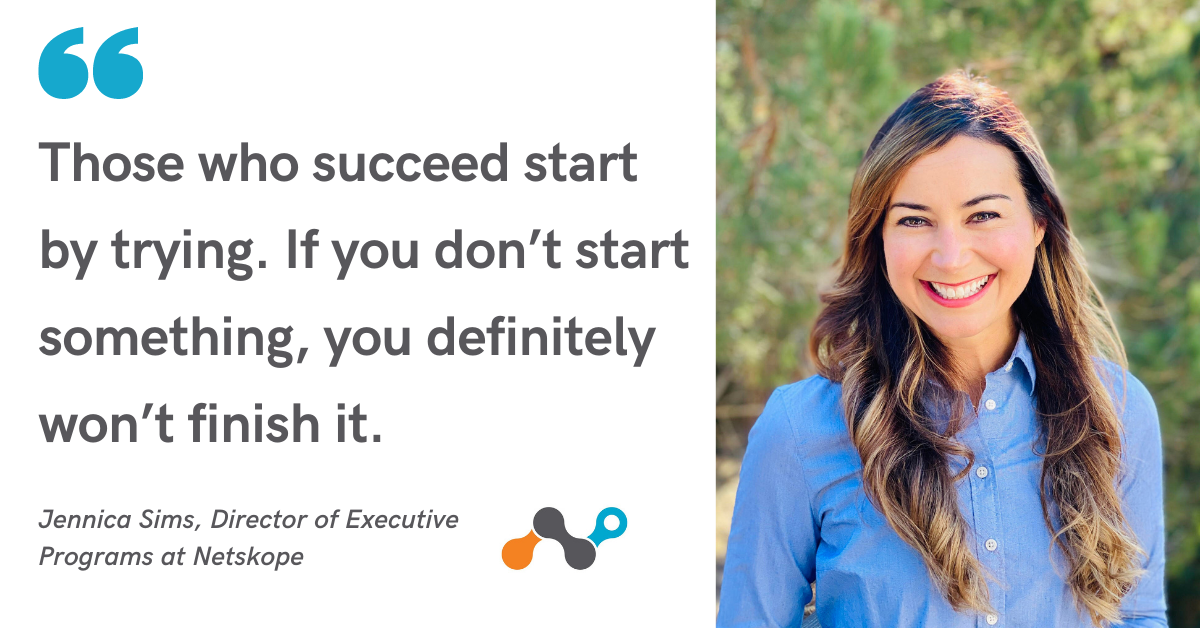Jennica Sims uses KPIs with the marketing team she manages at Netskope. She also uses them with her family.
"It might sound strange," says Jennica, "but it really means that I'm able to measure and analyze things that matter to me. My job and my family are very important to me." Jennica, who is the Director of Executive Programs at the cloud security company, continues: "If I'm able to reflect objectively on my work, but not other aspects of my life, then it becomes harder to realize progress in all areas. Setting KPIs at work and at home means I can reflect objectively in all areas and accurately measure progress."
To set those KPIs at work, Jennica follows a planning cycle and checks in regularly to make sure she is on track with those indicators (qualitative and quantitative). She does the same at home by sitting down with her kids on a regular basis to ask them what's most important to them. "It might be to spend 20 minutes a day reading to my children or having them read to us [my husband and I]," she says. "Or it might be something larger, like when my son came to us and told us he wanted to build and prototype a car that isn't dependent on fossil fuels or batteries. He's eight, so at this age, it's taking steps to achieve incremental milestones within a large, long term goal."
Jennica understands that not everyone is as much of a planner as she is. But she attributes her love for strategy and planning to having started this very early in life. "My father taught me how to play chess when I was four," Jennica says. "It's a strategy game and being able to see several moves ahead (and be proactive with your longer term approach) helps you be more successful in the end game. Everything about it is a learning opportunity, even losing." This has reminded her over the years to be proactive about seeking opportunities to grow and learn, and she encourages everyone to do the same—including and especially in 2021, as we'll (hopefully) be starting to come out of this pandemic.
We sat down with Jennica to learn how goal-setting impacts her work at Netskope and what advice she has for PowerToFly readers on how to set goals for 2021.
Learning to adapt
Jennica was excited to join Netskope because the company met her criteria for a new role: it had a "success trajectory," or a proven track record of being able to execute on an ambitious, innovative vision; she found fellow employees to be equally high energy and motivated; and she believed in the culture. Within a year, her growth-focused mindset and planning helped her grow from a manager role to a director. She now leads Corporate Events, Executive Briefings, Customer Marketing & Advocacy, and Online Community for Netskope.
But this last year of growth hasn't been without its challenges. Even as Netskope's cloud security offerings have become more vital than ever, Jennica and her peers in leadership have worked hard to figure out how to shift their management to an all-virtual setting and, more importantly, how to define business success in the middle of a pandemic.
"I think it's important for me to be honest," says Jennica. "I spent the first couple of months of the pandemic constantly iterating on a workable schedule as I took on new responsibilities at work and at home, helping to teach my children. It was a rough start."
She learned to adapt, though, and moved her planning cycle from an annual cadence to a six-month cadence, recognizing that things were changing fast enough to make long-term planning less than optimal. As goals changed, so did her markers of success.
For example, her team is responsible for Netskope's executive briefings (C-level experiences where Netskope's executive team collaborate with C-suite clients on security and networking issues). As those events pivoted online, the lift that Jennica's team could provide changed; they could plan the interaction much faster, but the offering wasn't initially as deep given the communication platform.
"At the beginning of the year, I had a goal for a certain number of collaborative briefings and now that outcome is a lot higher, but our focus is all about meaningful dialogue rather than the experience around it," explains Jennica.
6 tips for success: how to set and pursue achievable goals
Whether she's setting and pursuing goals for work, her personal growth, or her family, Jennica follows the same process each time.
If you're setting goals for the first time—or even if you're just looking back on goals from last year—she reminds you to start this process with grace. "This is an unprecedented time, and you might need to recalibrate your expectations for what accomplishment looks like," she says. "If [you're] feeling overwhelmed, focus on fewer large outcomes. Instead, focus on smaller achievements to help build a baseline. Once that baseline is established, develop a few longer term goals to track, and check in with them frequently. [And] use the life tool of positive self talk. What you hear yourself say is what you ultimately believe to be true. Make sure that dialogue is healthy around goal setting as well."
And on to Jennica's six tips:
1. Start each day with gratitude. "Remembering all the things I can be thankful for puts me in a better position to handle challenges and unexpected roadblocks throughout the day," says Jennica. She shares an example of the power of a morning gratitude practice: the day of our interview, she woke up and prayed, remembering what she's thankful for, and credits that reflection time with helping her not lose her cool when her son decided to not get dressed that morning. "I think on a morning that I had forgotten to do that exercise, I would have been very frustrated with the fact that he hadn't listened. But I was able to remember a core tenant that's important to me: people first. He is a person, he has feelings. It's not worth getting upset over, and I can be grateful that he's my child and grateful that this is a learning opportunity for us both."
2. Do what's great, not what's good. "There are thousands of things pulling on all of us," says Jennica. "I'm sure you feel this way every day. You're going to wake up in the morning and all of your many responsibilities will likely surface at once, creating tension. Follow a routine, and ask yourself: does this map back to something central that I discussed with my stakeholders, be it at work or home, and is it central to what I'm trying to accomplish? If I'm doing something either professionally or personally that doesn't map back to a core goal, then I deprioritize it." This is prioritizing what's "great" and relinquishing what's only "good." For example, if you're volunteering with multiple organizations and realize you're feeling overextended, she'd encourage you to map back to your goals, identify the one or two organizations that are most important to you, and allow yourself to drop the others.
3. Be proactive. "Those who succeed start by trying," says Jennica. "If you don't start something, you definitely won't finish it. Planning helps with this too, and doing research prior to a new situation," she continues. "For example, I always ask for an agenda prior to a meeting. That way I can go in prepared and have a proactive voice in the conversation, or know if my role is meant to be active or passive. It requires extra work up front, but saves time and effort in the long run and allows you to prepare for and help drive outcomes."
4. Be curious. Jennica has no qualms about saying that she knew little about cybersecurity prior to joining Netskope. "I still ask questions all the time, and I'm 1.5 years in," she says. "You learn by asking questions, and being a lifelong learner is an attribute that will always help you grow. Having the humility to ask questions is an asset to your success."
5. Calibrate and communicate. "To know if you're meeting your goals, you have to have regular touchpoints where you measure your progress," explains Jennica. "There are many external factors and you need to be frequently iterating on what achievement looks like for you. If [I'm] not actively working on a specific goal, I check in monthly to see where I'm at with that goal and if I need to adjust timings or KPIs, and then communicate appropriately with those involved."
6. Set appropriate boundaries. You can probably tell that Jennica is driven by achievement. But she recognizes that while that's a strength, it's also a limitation. "Something I'm working on is seeing the possibility of burnout before it arrives and overtakes. I have a very busy work and home life, so making sure I set aside routine time for my mental and physical health is paramount," she says. "It's okay to have blank space, to have quiet time. For those who don't naturally build this time in, I recommend scheduling it."
Jennica recognizes that 2020 wasn't the easiest year, and that acknowledgement is important when it comes to measuring success. "I have to remind myself, for every failure, there are several successes," she says. "When I fail (and I will), I try to fail quickly and fail forward, learn from that circumstance, recalibrate, and try again, tweaking outcomes or expectations. Reflecting on this year, I can look back at the things I didn't do, or I can remind myself that this year, I took the opportunity to overcome adversity and use what has been a gritty time to become stronger. Now I can use that strength and build on it in the new year."
Want to work towards achieving your professional goals alongside Jennica at Netskope? Check out their open roles here.




